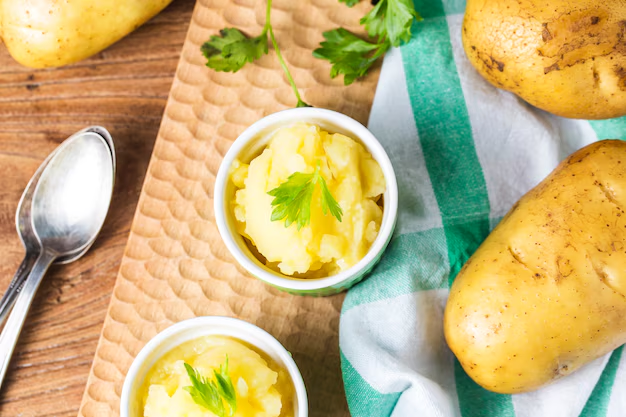Can You Buy Potatoes with WIC? Understanding Your Options and Benefits
Shopping with WIC benefits can sometimes feel like solving a puzzle, especially when you're standing in the grocery aisle wondering which products qualify. If potatoes are on your shopping list, you might be asking yourself, "Can I buy potatoes with WIC?" If that's you, then pull up a chair and stay a while, because this guide has all the answers you're looking for.
Understanding WIC: The Basics
What Is WIC?
WIC, short for the Women, Infants, and Children Program, is a federal assistance initiative designed to provide nutritional support to low-income pregnant women, new mothers, and young children up to age five. It aims to promote healthy eating habits during critical development stages by providing eligible families with food benefits, nutrition education, and access to healthcare resources.
WIC's Nutritional Mission
The program operates with a mission to address nutritional needs among vulnerable populations. Therefore, the items covered by WIC focus heavily on essential nutrients such as protein, calcium, iron, and vitamins like A and C. These nutrients are crucial for growth, development, and overall health.
Are Potatoes Eligible for WIC?
Fresh Produce and WIC
Buying fresh produce with WIC can sometimes be straightforward, but there's a catch. Potatoes, as part of fresh vegetables and fruits, generally qualify under the WIC Fresh Fruit and Vegetable Program. WIC's focus on providing balanced nutrition often means any conventional fresh produce that isn't pre-prepared or pre-cooked is likely included. However, there is a historical footnote—white potatoes were once excluded from WIC's list, but they are now generally covered.
Check the Local WIC Structure
Since WIC is managed by both federal and state guidelines, the specific eligibility of items like potatoes can vary by state. It's important to review your state's WIC-approved food list, as updates to what qualifies can change based on revised nutritional guidelines or local administrative decisions.
Other Form Factors
If you're inquiring about other forms of potatoes—like frozen or canned—these might be covered under different WIC categories. Typically, these need to meet certain criteria, such as being low-sodium or without added sugars and fats, to qualify under WIC's broader scope of allowable items.
Making Use of WIC Benefits: Practical Tips
Be Prepared Before You Shop
Proper preparation can make redeeming WIC benefits seamless:
- Review Your Benefits:📋 Understand your WIC benefits summary card or receipt to confirm available funds and eligible food categories.
- Verify with Staff:🛒 Store clerks at checkouts or customer service desks can often help answer eligibility questions specific to their store's system.
- Check Store Signage: Many stores use labels to mark WIC-eligible items, which can help you quickly identify qualifying products in the aisles.
Practical Shopping Tips
- Separate Non-WIC Items: During checkout, it can be helpful to separate WIC items from non-WIC purchases to streamline the payment process.
- Double-Check at the Register: Be prepared for the occasional discrepancy at checkout when it comes to item eligibility. Discuss potential issues with the cashier or request assistance from a customer service agent.
📝 Quick Tips
Here’s a handy checklist to ensure a smooth WIC shopping trip:
- ✅ Check approved lists before heading out.
- ✅ Keep WIC documentation handy in your wallet or phone.
- ✅ Plan meals around eligible foods to maximize benefits.
- ✅ Communicate with other users or support groups for tips and updates.
Navigating the Grocery Store: Common WIC Questions
What Other Foods Can Be Purchased with WIC?
WIC benefits cover a range of other nutritional categories, including but not limited to:
- Whole grains: Such as bread, tortillas, and cereal.
- Dairy products: Like milk, cheese, and yogurt.
- Protein sources: Including eggs, beans, and some types of fish.
Pro-tip: Always verify "store brand" or "off-brand" options, as they are often eligible for WIC and represent significant savings.
How Often Are WIC Benefits Updated?
WIC benefits and eligible item lists are periodically reviewed and updated to reflect current nutritional science and budgetary allocations. Keeping up-to-date with official notifications from local WIC offices or websites is a wise habit.
Optimizing Nutritional Value with WIC
Meal Planning with WIC
Mastering meal planning can enhance how WIC benefits your family's nutrition:
- Balance Proteins and Carbs: Combining WIC-approved grains with potatoes can provide a balanced meal.
- Seasonal Considerations: Take advantage of seasonal produce, which may have better prices and availability.
- Try New Recipes: Explore creative ways to use approved ingredients through online recipe resources.
Stay Engaged with WIC Education
WIC doesn't just stop at food provision—it also offers educational workshops on nutritious eating, breastfeeding support, and health consultation services. Attending these sessions can provide valuable insights into the best nutritional practices and how to maximize WIC benefits.
A Closing Thought: WIC as a Pathway to Health
By understanding how to navigate the WIC program effectively, you're taking significant steps toward ensuring better health and nutrition for yourself and your family. Always stay informed of changes in eligibility or benefits, reach out for support when necessary, and engage with the WIC community—both in real life and online—for the best experience possible.
Embrace the WIC program as a supportive tool on your journey toward healthy eating, confident shopping, and ultimately, a nourishing lifestyle for you and your loved ones. 🍽️🥔

